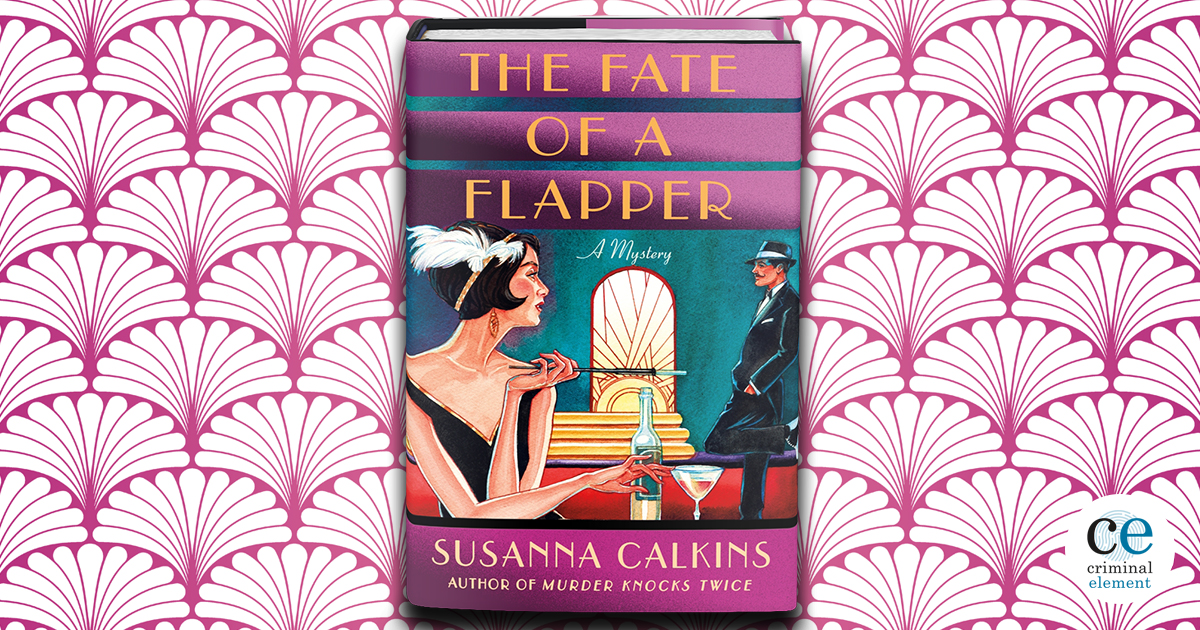Book Review: The Fate of a Flapper by Susanna Calkins
By Janet Webb
July 23, 2020
Nineteen twenty-nine is a turbulent, troubled time in Chicago. The volatile stock market is showing signs of overheating. For nine months, Gina Ricci, the heroine of Murder Knocks Twice, has been a cigarette girl at Chicago’s premiere speakeasy. During the day she works at Mr. Rosenstein’s pharmacy while also lending at hand at her father’s in-house appliance repair business. Surviving without a safety net requires a “Use it Up, Wear it Out, Make it Do or Do Without!” mentality. Gina protects the pride of her disabled dad by fixing broken appliances surreptitiously, when necessary. Lastly, Gina has capitalized on her cousin Marty’s bequest of his photography equipment and studio, improving so much that she dreams of The Signora hiring her to be the Third Door’s photographer.
See Also: Excerpt of The Fate of a Flapper
Her personal life is complicated. She’s not interested in the overly handsy patrons who frequent the Third Door. She has her eye on Roark, a former policeman, but a ruin of a man when they first met. Roark’s life improved “since he’d been hired to take crime scene photographs for the nation’s first forensic lab.”
He’d never talked much about his time either on the force or when he was a lieutenant in the Great War, but both experiences had left him scarred and wounded in different ways. When she’d met him, he’d been using a cane to walk, but as he had healed, his vibrancy had returned.
Gina’s cousin Nancy Doyle, a policewoman, asks her to rush over to take photographs of a dead girl. Nancy tells Gina that she doesn’t want to be cut out of the investigation and that the photographs might give her a leg up. Affirmative action was not a thing in the Roaring Twenties. Gina recognizes Fruma, the dead girl. She and her friend Adelaide had been drinking heavily the night before at the Third Door.
Adelaide had begun to cry again. “Oh, I should never have gone to bed. What kind of again. “Oh, I should never have gone to bed. What kind of friend am I? She was suffering. I just know it. Maybe she want to do away with herself. Took an overdose?”
“Suicide?” Nancy asked, considering the body, peering down at the substance on the woman’s lips and nose. “Hmmm … Could that powder be cocaine, not a sleeping potion? Or heroin maybe?”
Since Gina was gifted her camera, she’s become an accomplished photographer but unlike Roark, she’s an amateur. He has questions.
“You saw me on the street, taking a walk near where my cousin Nancy Doyle lives.”
“You were visiting her?” When Gina didn’t reply, Roark continued. “Look. I know you were at Fruma Landry’s apartment. Don’t bother denying it. What I don’t know is what you were doing there.”
Gina folded, giving up the pretense. It seemed pointless to lie, particularly since he’d probably find out the truth sooner or later anyway. “Nancy called me around eight a.m. Asked me to bring my camera. She asked me to photograph the scene.”
“What?” he exclaimed. “Why you?”
The question stung. “Why not? I’m plenty good enough.”
“Settle down, bearcat. You are plenty good enough.” Without asking, he began to study some of the recent photographs that she’d left spread across the table. “You definitely getting very comfortable with the camera.” He smiled at her then, with the funny twisted smile that made her heart lurch. Then his jaw clenched. “Tell me why Officer Doyle asked you to photograph the scene. Be straight with me.”
Gina sighed. “She wanted her own set of photographs.”
He looked exasperated. “In heaven’s name, why?”
“Nancy just wanted in on the investigation. The men on the force keep her off the good cases.”
Roark shrugs, more perturbed at a civilian on the scene of a possible criminal investigation than at Nancy’s slights from her fellow cops. But Gina understands Nancy’s wish to be on the team.
Back to Fruma’s inexplicable death, might she have drunk bad liquor? Tainted alcohol was a problem.
Certainly there were stories in the news, practically every day, about people dying from alcohol poisoning. People would take all sorts of stuff to get squiffy. Wood alcohol, grain alcohol.
Prohibition didn’t stop people out for a good time from frequenting the vibrant underground speakeasy scene while other people drank to drown their sorrows. Take Stan Galinsky, the father of a newspaper lad Gina knows, who’s “still yukking it up with his pals.” Stan’s drinks take food out of his family’s mouth. “All of them drinking away their weekly paychecks.” Gina confronts Stan but he has a few home truths of his own.
A flicker of shame danced in his eyes before he turned away. “Lemme alone,” he slurred. “Or I’ll tell the Signora you’re trying to drive away her customers. She wouldn’t like that, would she?”
That’s true, Gina silently agreed, taking a step back. What would the Signora do if she warned off a paying customer?
Gina is caught between the proverbial rock and a hard place. She knows how much folks are suffering, and she has a moral compass that she can’t ignore. She notices the interaction between the police and the speakeasy employees, an uneasy détente at best. Does it seem as if there’s too much on Gina’s plate? Not really because she focuses on what’s truly important: her family, her friends, and her community. If a woman died, if other patrons got seriously ill, after drinking cocktails at the Third Door, Gina will get to the bottom of it.
For light relief, the book takes place during the 1929 World Series when the Philadelphia Athletics faced Chicago’s Cubbies. When it comes to baseball, hope always springs eternal. Readers will be very interested in Gina’s fate after the stock market crash of 1929—roll on Speakeasy Murder number three!
